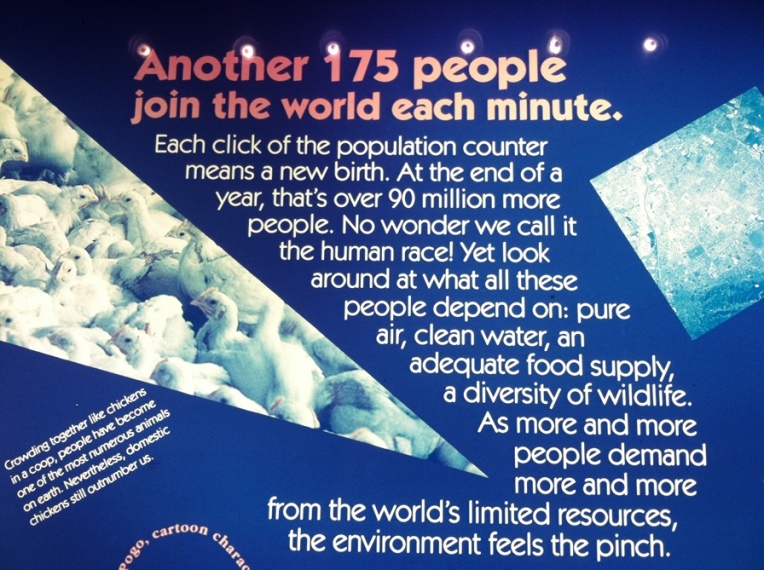“Sometimes I wish we didn’t exist.”
These tragic words of a sixth grader being interviewed during an Earth Day “celebration” cannot say more about the detrimental impact of the radical green environmentalists agenda on the human psyche. The moral implications of this are staggering. Respect for human life and human dignity must remain at the forefront of any of these causes, no matter how well-intentioned they may seem.
Here’s the interview (it’s only about 1:30):
Truly awful.
Just to pass some time before going to a friend’s house over Memorial Day weekend, we stopped at the Patuxent Wildlife Conservatory in Laurel, MD, which is run by the United States Fish and Wildlife Service. Even though I am well aware of the propaganda being used to promote “humans are bad for the planet” agenda, I left feeling pretty crummy. Maybe I was brainwashed by the creepy video they showed at the end of the tour.
Below are some photos I took during our Orwellian experience. One of the exhibits was about wolves. The narrator said they were “misunderstood” animals and that were hard to study close up in their natural habitat. Yeah, because they’ll eat you! These people would have saved the dinosaurs. Poor misunderstood and unappreciated T-Rex! Chomp.
Another 175 People Join the World Each Minute!
 “People have become one of the most numerous animals on earth.” And we just keep on coming. Everyday, 175 more mouths to feed, clothe and support! As the little sidebar says, we’re “Crowding together like chickens in a coop.” Kinda makes ya look at your fellow human polluters with disdain and disgust.
“People have become one of the most numerous animals on earth.” And we just keep on coming. Everyday, 175 more mouths to feed, clothe and support! As the little sidebar says, we’re “Crowding together like chickens in a coop.” Kinda makes ya look at your fellow human polluters with disdain and disgust.
Plants, Animals, Humans – We’re All Citizens of the World!
 What? No passports required? Not when you’re a free-flying global citizen! I think next time I head up to Niagara Falls and cross over into Canada without my “papers” I’ll just declare that I’m a migratory bird and a citizen of the world!
What? No passports required? Not when you’re a free-flying global citizen! I think next time I head up to Niagara Falls and cross over into Canada without my “papers” I’ll just declare that I’m a migratory bird and a citizen of the world!
Billions and Billions of Tons of CO2

Even if human “animals” were to become extinct, it would only affect 4% of the total CO2, which is only a tiny fraction of the atmosphere. Actually, our decaying bodies might unleash even more CO2. And the pursuit of this miniscule reduction in emissions is costing us dearly as resources are diverted from real problems we can actually solve.
DDT – Banned for Life
The controversy over the ban on DDT continues to this day, decades after Rachel Carson’s book Silent Spring. As Ronald Bailey from Reason.com magazine wrote:
“In Silent Spring, Rachel Carson asked, “Who has decided—who has the right to decide—for the countless legions of people who were not consulted that the supreme value is a world without insects, even though it be also a sterile world ungraced by the curving wing of a bird in flight? The decision is that of the authoritarian temporarily entrusted with power.”
“Banning DDT saved thousands of raptors over the past 30 years, but outright bans and misguided fears about the pesticide cost the lives of millions of people who died of insect-borne diseases like malaria. The 500 million people who come down with malaria every year might well wonder what authoritarian made that decision.”
Furthermore, in Ronald Bailey’s article Greens vs the World’s Poor, he states:
“The scientific literature does not contain even one peer-reviewed, independently replicated study linking DDT exposures to any adverse health outcome” in humans, says Amir Attaran. “No study in the scientific literature has shown DDT to be the cause of any human health problem,” concludes Richard Tren and Roger Bate in ‘When Politics Kill: Malaria and the DDT Story,’ a new study from the Competitive Enterprise Institute.
Look! Non-Point Pollution – And the reason for Maryland’s Rain Tax:

Humans are just too dirty to live near water. Well, except the elites crowding up the coastline of CA and FL as well as Martha’s Vineyard, they can stay.
Wetlands – Environmentalists’ Holy Land
 Declaring places “wetlands” has become yet another excuse for curtailing most human activities. Looking at the map, the entire state of Florida should have never been developed.
Declaring places “wetlands” has become yet another excuse for curtailing most human activities. Looking at the map, the entire state of Florida should have never been developed.
It’s More Than Numbers

That first sentence alone sent chills down my spine. Ugh, humans and our wants and needs, like food and land further compound “the problem” of our mere existence. We scrape and scour land to steal resources from the plants and animals that deserve it more than we do. This stuff was written by fellow humans, right? As far as I know, the Whooping Crane doesn’t write.
Resources for the Future – There Just Aren’t Enough

And the more people there are, the more “resources” we’ll be hogging up … especially us ugly Americans. When Al Gore and all his cronies begin living in a hippie bio-dome communes and pooping in a compost toilets full-time, then come see me.
Trouble in Paradise 
Oh, these poor plant and animals who “lived in isolation” (as if they had any concept of this) before those nasty settlers arrived on the shores of Hawaii. The first time I read this, I thought they were referring to the explorers as the “plant-munching, disease-carrying, egg-eating animals,” but they must mean the predators and rodents that were brought into the area along with the human “animals” that disrupted the peaceful lives of the plants. Right?
Caution – Pesticide Application
 But I guess not all nature is worth saving. It’s ‘do as I say, not as I do’ at this taxpayer funded natural habitat. Just as long as it’s not DDT! Maybe I should have reacted like these truly caring people to the loss of vegetation from these pesticides.
But I guess not all nature is worth saving. It’s ‘do as I say, not as I do’ at this taxpayer funded natural habitat. Just as long as it’s not DDT! Maybe I should have reacted like these truly caring people to the loss of vegetation from these pesticides.
Yes EarthFirst! is the group from which the following quotes emanated:
“I suspect that eradicating small pox was wrong. It played an important part in balancing ecosystems.” – John Davis, editor of Earth First! Journal
“My three main goals would be to reduce human population to about 100 million worldwide, destroy the industrial infrastructure and see wilderness, with it’s full complement of species, returning throughout the world.” Dave Foreman, co-founder of Earth First!
Gee, maybe someday the animals and trees will begin a “save the humans” campaign.

